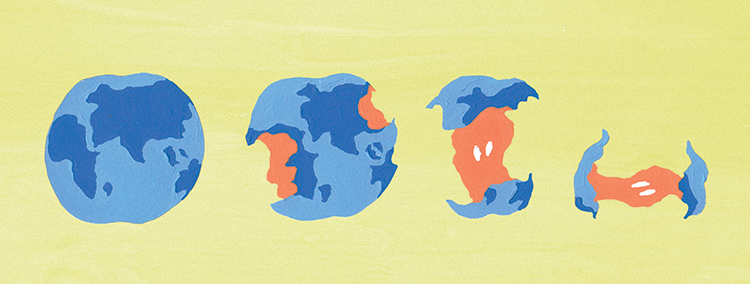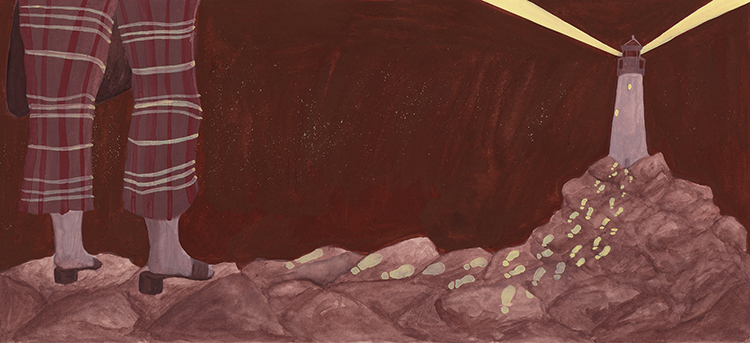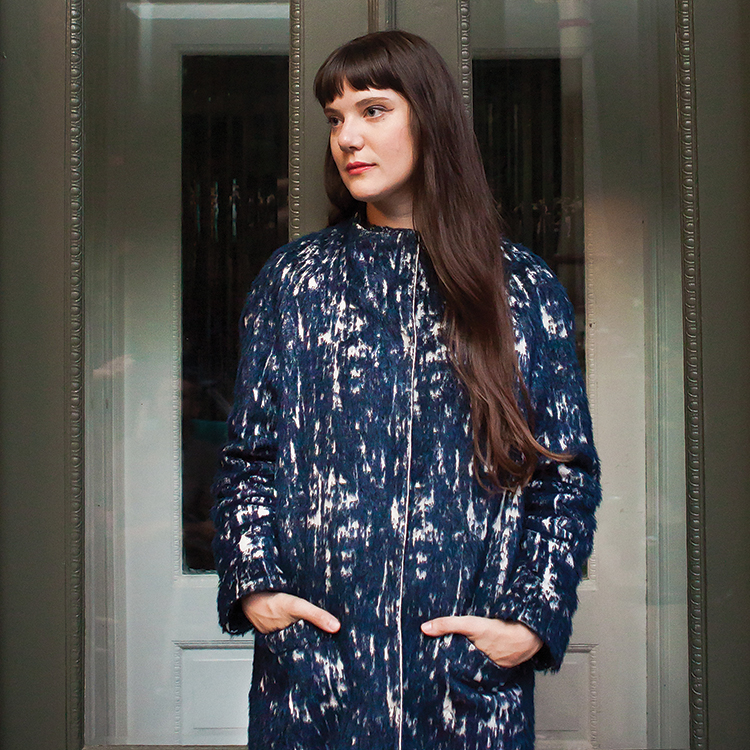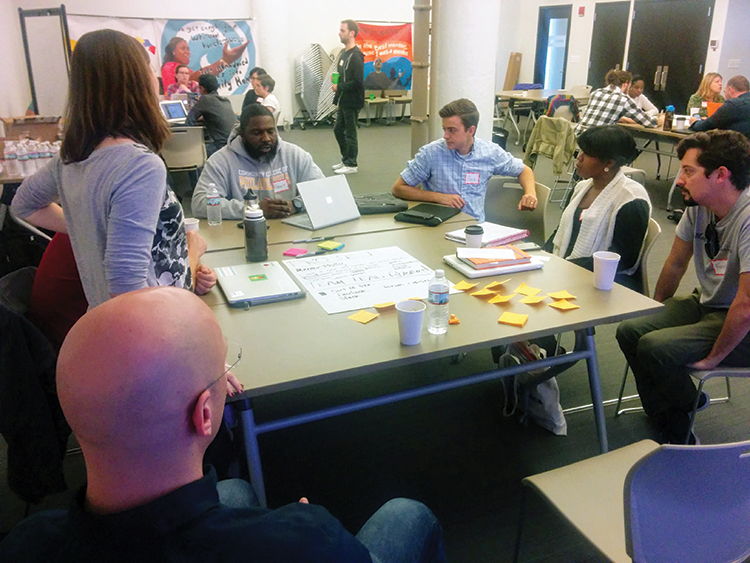If we’ve all lost our minds together, can we really know what’s happening?
Illustration by Jameela Wahlgren
Interview by Heather Shayne Blakeslee
Occasionally, a great reckoning will sweep through a culture, unveiling a world that will be shocking to some and unsurprising to others, but forcing change nonetheless. Take, for instance, the election of Donald Trump, which has thrown America’s long history of racism and our culture’s pervasive misogyny into the center ring of our current cultural, post-truth circus. But what will finally force a real conversation about the global threat of climate change? In his eloquent and unsparing book, “The Great Derangement: Climate Change and the Unthinkable,” Indian writer Amitav Ghosh explores the cultural, political and psychological history of our species’ inability to grasp that our daily habits are threatening our lives. He seamlessly weaves together stories and statistics to remind us that the world humans have constructed is by no means under our control: Earth has limits, and so do we. But at what point will we recognize—and reckon with—that fact? And how do the stories we tell ourselves about the past and the future contribute to that reckoning?
You are best known as a fiction writer. What made you decide to write the lectures that constitute “The Great Derangement: Climate Change and the Unthinkable”? And what role does fiction, or the humanities in general, play in helping us to process and understand our world?
AG: For me, climate change is impossible to ignore: It is the most important question of our times, and I wrote the book because I felt that it demands a response from every thinking person. Just as people once asked their parents, “What did you do during the war?” a future generation is going to ask their parents, “Why didn’t you pay attention to climate change?”
As human beings, stories are fundamental to our understanding of the world. Perhaps if we listened to different stories we would better appreciate the scale of the challenge that we now face as a species.
You write in the book that our lives are not guided by reason but by “inertia and habitual motion” and that “those who uproot themselves and make the right preparations [for climate change] are precisely those obsessed monomaniacs who appear to be on the borderline of lunacy.” And you very specifically chose to use the word “derangement” in relation to the vast majority of people who cannot comprehend climate change. What does it mean to be sane at this point in our history as humans?
AG: I don’t think any of us can claim to be sane at this moment. We are all living in a kind of collective delusion, in which the political and economic discourse continues to conjure up horizons of unlimited “growth,” and we continue to use the very things that will ultimately destroy us—cars, planes, etc.
You observe that one effect of modernity is the shift in how we think about nature. In our literature and in our art, nature used to be an awesome force to be feared, respected and revered. And then—through our increased proficiencies in science, technology, engineering and math—we came to believe that we could control nature. How does it feel to you to be witnessing the results of our limitations? Of our hubris?
AG: It wasn’t just that modernity led people to believe that “nature” could be controlled—it led them to believe that the earth is inert. It is this illusion that has been shattered by climate change. James Lovelock’s seminal book “Gaia” showed us that in many respects the Earth functions as a living organism. But, of course, this is what most premodern cultures believed anyway.
I’d like to talk about cultural memory. Great quantities of humans now live in places where our ancestors felt it unsafe to populate. You write in the book about the great incentives it took to get modern people to live on the island of Hong Kong, and about stone tablets left by earlier generations on the coast of Japan, warning of tsunamis and advising, “Don’t build past here!” Yet we chose instead to build not only a settlement but a nuclear facility there. One-third of America’s infrastructure is in our hurricane-prone Gulf Coast. Are we about to enter an age of remembering?
AG: The list of cities that are facing potentially catastrophic impacts is growing by the day. Hurricane Harvey may have been an important inflection point in the U.S.—at any rate, it seems to me that much more attention is being paid to this issue today.
One of the most enlightening parts of the book is the time you spend laying out how Eurocentric the dialogue around climate change is, and how the history of empire and of colonialism has also played a significant role in this story. Can you talk a little about that?
AG: It is a fact that the discourse on climate change is very Eurocentric. But this is, strangely enough, partly the fault of non-Westerners, because climate change is not a major subject of discussion in countries like India, China, Indonesia and so on—even though they all stand to lose a great deal.
The impacts on India are widespread and intensifying. The most notable impacts are prolonged droughts, extreme heat waves, an increasing number of “rain bomb” events, and more and more agricultural land being invaded by seawater.
Most people cannot comprehend climate change or their contributions to it. We are also bad at imagining the sheer numbers of people who will be affected. You write that “the consequences are beyond imaginable: The lives and livelihoods of half a billion people in South and Southeast Asia are at risk.” What can help us conceive of this problem or how it will affect our fellow humans?
AG: The vastness of the scale of climate change is one of the factors that prevents us from grasping the enormity of the challenge, especially because we have become accustomed to thinking in delimited ways. Our approach to problems is to break them down into tractable units—but that often makes us lose sight of the interconnections of the big picture.
You cite many statistics in the book: Predicted sea-level rise may displace 50 million people in India; a temperature rise of 2 degrees Celsius will decrease food production there by 25 percent; China feeds 20 percent of the world’s population on 7 percent of the world’s arable land, and desertification there is already causing $65 billion per year in losses. Scholars such as Robert Paarlberg have written that, because the United States may not see some of these same impacts and because our fossil-fuel lobby is so strong, U.S. action is stymied. Do you agree? And can the world solve this without the United States?
AG: I think the whole framing of climate change as primarily a threat to the world’s poor is very misleading. The truth is that everybody stands to lose in proportion to their circumstances. For many subsistence-level farmers, the impacts will surely be disastrous in that they will lead to complete immiseration. But in gross terms, the rich stand to lose the most, partly because they simply have more to lose and partly because they are more dependent on advanced infrastructure. During Hurricane Harvey, for instance, some of the richest people in one of the world’s richest cities were very badly impacted. Similarly, Puerto Rico is technically a part of the world’s richest and most advanced country, yet most of its people remain without electricity many weeks after Hurricane Maria. Cuba, by contrast, has been relatively resilient. In 2017 the U.S. probably had a higher tally of climate-related losses than any other part of the world.
Is there anything that gives you hope that we’ll solve this crisis?
AG: In my view, the idea that all problems have a “solution” is itself a hindrance in regard to thinking a
bout climate change. At this point “coping” or “adapting” might be better words to use because many climate change impacts are already locked in—no matter what we do now.
_____
Amitav Ghosh is a celebrated writer whose books include “The Circle of Reason,” “Dancing to Cambodia and at Large in Burma” and “Flood of Fire.”








